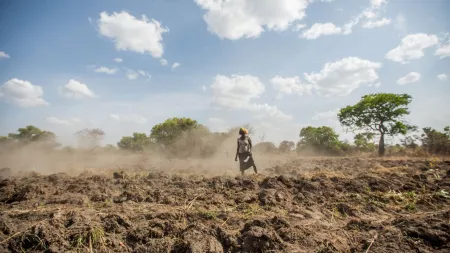Glasgow, United Kingdom, November 13 — The 26th UN Climate Change Conference of Parties has drawn to a close with a decision that has left vulnerable countries most impacted by climate change frustrated and disappointed, according to CARE International.
The negotiations continued into the late hours of Saturday, with the decision language weakened on loss and damage and fossil fuel subsidies, the issues most relevant for the global South and countries experiencing the worst climate impacts.
“We had hoped for a real plan, but instead developed countries only agreed to a vague two-year dialogue on arrangements for loss and damage funding without a clear outcome in sight,” said Chikondi Chabvuta, Southern Africa Advocacy Lead with CARE International.
“We welcome progress on the Santiago Network on loss and damage for technical assistance, but in light of the scale of the threat, it falls far short. When in my country of Malawi, we are still picking ourselves up and trying to recover from the devastation of Cyclone Idai, it’s been very hard to witness countries trying to push hard for weaker text right up to the final hours. Sadly the US and the EU made claims of solidarity publicly for the cameras, but behind closed doors it has been a different story. Despite pleas from the G77 and Least Developed Countries, in the negotiating rooms they are drawing hard lines on loss and damage and refusing to put forward the funds we need.”
The two-week climate conference in Glasgow started positively, with announcements from world leaders and varied groups of countries on deforestation, methane reduction, gender, and the coal transition. Multilateral cooperation between China and the US seemed to recognize the gravity of the situation.
However, CARE is concerned that forward-looking pledges and plans rely on immediate implementation, while lengthy dialogues don’t recognize the urgency for the poorest who did the least to cause this crisis but are suffering the most.
“We came into this COP with very clear signs from the science on how to repair the injuries we have caused the planet,” said Sven Harmeling, Global Policy Lead from CARE International. “We need to transition quickly and fairly from fossil fuels into clean, renewable energies, and boost support and protection for people most impacted by climate disasters. The COP26 outcome includes elements which, if fully implemented, might result in some repair of the injuries, but it hasn’t dealt with the urgent and immediate damage in concrete terms. The commitment by developed countries to double adaptation finance by 2025 is an important step -- but they should have fulfilled this today, as well as their 100bn commitment. Likewise, we welcome the request that countries revisit their emission reduction targets by 2022, but if we want to stay under 1.5°C, a lukewarm call on reducing subsidies for fossil fuels just looks like a smokescreen and a deceit by major emitters.”
There was also massive disappointment by civil society around the inclusivity of this COP, with many countries unable to travel because of COVID-19 restrictions, access issues in negotiating rooms, and a disproportionate gender balance. There were more lobbyists for big polluters than for any national delegation, according to Global Witness, and of the 109 world leaders who gathered at the start of the conference, less than 10% were women.
“The world’s most powerful men are still making decisions that fail to tackle the climate crisis with the urgency called for by women and girls in the global South, who already feel its impacts,” said Francesca Rhodes, Senior Advocacy and Policy Adviser for Gender and Climate Change at CARE International UK.
“The COP26 Presidency called for more action from Parties to make progress on the Gender Action Plan and gender responsive climate finance. Although we saw some welcome commitments from Parties, including the UK’s £165m and Canada’s pledge that 80% of its climate finance will support gender equality, these do not go far enough. It was also concerning that the Action for Climate Empowerment decision failed to include gender and human rights language.
“Before the next COP, rich countries must meet their commitments on climate finance, which must be new and additional, scale up adaptation to 50% and mobilize resources for Loss and Damage. Across all these areas, gender equality and women’s leadership must be integrated and prioritized.”
The 27th UN Climate Change Conference of the Parties will be hosted by Egypt and held in Sharm el-Sheikh in November 2022.
Contacts
Juliet Perry, Communications Lead for Climate Change, +31615574513, [email protected]
